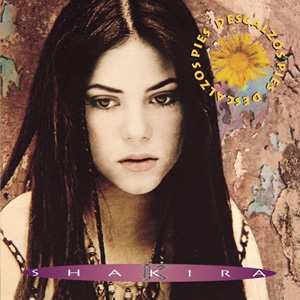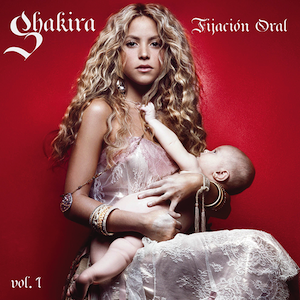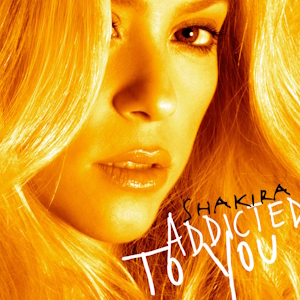
Gustavo Adrián Cerati was an Argentine singer-songwriter, composer and producer, considered one of the most important and influential figures of Ibero-American rock. Cerati along with his band Soda Stereo, were one of the most popular and influential rock and pop groups of the 1980s and 1990s.

Pies Descalzos is the third studio album and international debut by Colombian singer and songwriter Shakira, released on 6 October 1995, by Sony Music and Columbia Records. Its music incorporates Latin pop styles, additionally experimenting with pop rock elements. Looking to revive her struggling career after the commercial failures of her first two studio efforts Magia and Peligro, she assumed a prominent position in its production. As executive producer, Luis Fernando Ochoa co-wrote and co-produced each of the eleven tracks on the record with Shakira.

Fijación Oral, Vol. 1 is the sixth studio album by Colombian singer and songwriter Shakira. It was released on 3 June 2005 by Epic Records. After attaining international success in 2001 with her first English record, Laundry Service, Shakira wanted to release a fifth Spanish-language project as its followup. In the vein of her earlier work, Fijación Oral, Vol. 1 is a Latin pop album. Shakira enlisted Rick Rubin as executive producer, also working with Gustavo Cerati, Lester Mendez, Luis Fernando Ochoa and Jose "Gocho" Torres.

"Ojos Así" is a song by Colombian singer-songwriter Shakira for her fourth studio album ¿Dónde Están los Ladrones? (1998). It was released on 23 July 1999 by Sony Latin as the seventh single from the record. The song was written by Shakira, Pablo Flores, and Javier Garza, while production was handled by Emilio Estefan. Musically, "Ojos Así" incorporates elements of Arabic pop and world music. An English-language translation titled "Eyes Like Yours" was included on Shakira's fifth studio album and first English-language record Laundry Service (2001).

"No" is a song recorded by Colombian singer Shakira from her sixth studio album Fijación Oral, Vol. 1 (2005). It was written by Shakira and Lester Mendez and features Argentine singer-songwriter Gustavo Cerati, who also played the guitar and provided backing vocals to the song. "No" was released as the second single from the album on 2 July 2005, by Epic Records. A Latin pop ballad, it explores a woman's effort in trying to tell her boyfriend that she no longer wants to be involved in a toxic relationship and that separating is best for both.

Colombian singer and songwriter Shakira has released 11 studio albums, five live albums, two compilation albums, 68 singles and 62 music videos. With estimated sales of 80 million records worldwide as of 2014 according to Billboard, she is the highest-selling Colombian artist and the best-selling female Latin artist of all time. She is the only South American artist to peak at number one on the Australian Singles Chart, the UK Singles Chart, and the US Billboard Hot 100. Her singles "Hips Don't Lie" and "Waka Waka ", have achieved sales in excess of five million units, becoming some of the best-selling singles worldwide.

"Día de Enero" is the third single released from Shakira's sixth studio album Fijación Oral 1, following "La Tortura" and "No".

"Ciega, Sordomuda" is a song by Colombian singer Shakira from her fourth studio album, Dónde Están los Ladrones? (1998). A pop rock track, it utilizes mariachi trumpets and lyrically equates total love to a person being blind, deaf, and mute. It was released as the album's lead single on 4 September 1998 by Columbia Records and Sony Discos. The song was co-written by Shakira and Estéfano, while produced by the singer and Lester Méndez.

Shakira Isabel Mebarak Ripoll is a Colombian singer. Born and raised in Barranquilla, she has been referred to as the "Queen of Latin Music" and is noted for her musical versatility. She made her recording debut with Sony Music Colombia at the age of 13. Following the commercial failure of her first two albums, Magia (1991) and Peligro (1993), she rose to prominence in Hispanic countries with her next albums, Pies Descalzos (1995) and Dónde Están los Ladrones? (1998). She entered the English-language market with her fifth album, Laundry Service (2001), which sold over 13 million copies worldwide. Buoyed by the international success of her singles "Whenever, Wherever" and "Underneath Your Clothes", the album propelled her reputation as a leading crossover artist. Broadcast Music, Inc., described Shakira as a "pioneer" who extended the global reach of Latino singers.

Colombian singer and songwriter Shakira has released 62 music videos, 5 live albums, 8 films, and 4 documentaries.

"Te Lo Agradezco, Pero No" is a song recorded by Spanish singer Alejandro Sanz and Colombian singer Shakira, for Sanz's eighth studio album El Tren de los Momentos (2006). It was released as the second single from the record in December 2006 by Warner Music Latina. The track was written by Sanz, while production was handled by him along with Lulo Pérez. "Te Lo Agradezco, Pero No" is the second duet recorded by the two singers, following "La Tortura" for Shakira's album Fijación Oral Vol. 1 (2005). The song came about after she approached Sanz, telling him that she wanted to collaborate on something different from her own material.

She Wolf is the eighth studio album and third English-language album by Colombian singer-songwriter Shakira. It was released on 9 October 2009, by Epic Records and Sony Music Latin. As executive producers, Shakira and Amanda Ghost enlisted collaborators including The Neptunes, John Hill, Wyclef Jean, Lukas Burton, Future Cut, Jerry Duplessis and Timbaland. Musically, the record shifts from her traditional Latin pop and pop rock musical styles, instead exploring electropop, with influences of folk and world music. The lyrical themes of the album mostly focus on love and relationships and were based on the conversations Shakira had with her friends.

Sale el Sol is the ninth studio album by Colombian singer and songwriter Shakira, released on 19 October 2010, by Epic Records. The album marks a return to Shakira's signature Latin pop sound after the electropop record She Wolf (2009). The singer split the album into three musical "directions": a romantic side, a "rock and roll" side, and a "Latino, tropical" side. The latter two "directions" experiment with rock and merengue music, respectively. As co-producer, Shakira enlisted collaborators including Josh Abraham, El Cata, Gustavo Cerati, John Hill, Lester Mendez, and Residente from Calle 13.

"Loca" is a song by Colombian singer-songwriter Shakira, taken from her ninth studio album, Sale el Sol (2010). It was released by Epic Records as the lead single from the album. The Spanish-language version features Dominican rapper El Cata, and was released on 10 September 2010, while the English-language version features British rapper Dizzee Rascal, and was released on 13 September 2010. It was written and produced by Shakira, with additional songwriting from Edward Bello, Armando Pérez, and Dylan Mills. The song is a Latin pop and merengue track that lyrically describes Shakira's eccentric infatuation with a man. In August 2014, a senior US district judge found "Loca" to have been indirectly plagiarised from "Loca con su Tiguere", a mid-1990s song composed by Dominican songwriter Ramon "Arias" Vasquez. The case was dismissed in August 2015 after it was found that Vasquez had fabricated the evidence he had presented in court.

The Sun Comes Out World Tour was the fifth concert tour by Colombian singer and songwriter Shakira, launched in support of her eighth and ninth studio albums, She Wolf (2009) and Sale El Sol (2010). After a special tour preview show held in Montreal, Canada, on 15 September 2010, the North American leg of the tour commenced at Uncasville, Connecticut, on 17 September, and closed at Rosemont, Illinois, on 29 October 2010. The European leg of the tour was planned to commence at Lyon, France, on 16 November, and end in London, England, on 20 December 2010. The tickets for the initial dates of the European leg were soon sold out, and Shakira extended the tour into 2011, beginning by announcing a show at Paris, France; venues at countries such as Croatia, Russia, Spain and Switzerland were soon added. The Latin American leg of the tour was a part of the Pop Festival and visited countries like Argentina, Brazil, Colombia]], Mexico and Bolivia were added to the tour dates. The tour concluded in José Miguel Agrelot Coliseum in San Juan, Puerto Rico on 15 October 2011.

"Rabiosa" is a song by Colombian singer-songwriter Shakira, taken from her ninth studio album Sale el Sol. It was written by Armando Pérez, Edward Bello, and Shakira, and released by Epic Records as the third single from the album, on 8 April 2011. Two versions of the song exist; the English-language version, which features American artist Pitbull, and the Spanish-language version, which features Dominican artist El Cata. It is heavily influenced by merengue and dance music. Shakira and El Cata, or Pitbull, sing about each other's sex appeal in the song.

"Antes de las Seis" is a song recorded by Colombian singer-songwriter Shakira for her ninth studio album Sale el Sol (2010). Written and produced by the singer and her frequent collaborator Lester Mendez, "Antes de las Seis" is one of the "romantic" songs from the album and is musically a Latin pop ballad. It features a simple piano and acoustic guitar-supplemented beat over which Shakira delivers sad and emotional vocals. Epic Records released the song as the fourth single from Sale el Sol on 21 October 2011.

"Addicted to You" is a song recorded by Colombian singer-songwriter Shakira for her ninth studio album Sale el Sol (2010). The song was released as the fifth and final single from the album by Epic Records, on 13 March 2012. "Addicted to You" was written by Shakira, El Cata, John Hill and Luis Fernando Ochoa, and is a merengue-influenced song on the album. The song also draws prominent influences from merengue music, and lyrically describes Shakira's infatuation for a lover. Despite having an English title, the majority of the song is sung in Spanish.

"Can't Remember to Forget You" is a song recorded by Colombian singer-songwriter Shakira from her fourth English and overall tenth studio album, Shakira, featuring Barbadian singer Rihanna. Shakira began planning to make new music in 2011; work continued into 2012, at which time she left her previous label Epic Records and joined RCA Records. The song was released as the lead single of the album on 13 January 2014 through RCA Records and Sony Latin Iberia. A solo Spanish-language version of the song, entitled "Nunca Me Acuerdo de Olvidarte", was released on 24 January 2014.




















